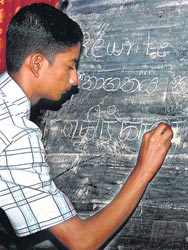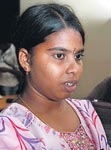|
Displaced
children rewrite the future
They do not yearn for toys or even
three square meals a day. They only wish for books,
teachers and lessons.
"Will we lose one year of school,"
asks 17-year-old V.M. Brintha, now struggling to attend
school in Kalmunai, after having been displaced from
Mutur due to the recent violence and adamant that she
would somehow sit the O/Ls even though books, pens,
uniforms and teachers are hard to come by.
 |
| Stressing the need for education,
M.M. Dilshan writes his appeal. |
"My brother who was very eager
to sit the Grade 5 scholarship examination was unable
to do so this year," laments Brintha who was in
Colombo recently to push the cause of education for
all children especially those affected by armed conflict.
Brintha, M.M. Dilshan and M.M. Wasana
Dilrukshi, all living in trying circumstances in the
east, were in Colombo to launch 'Rewrite the Future'
a global initiative by Save the Children to ensure quality
education for children affected by war worldwide. In
beautifully crafted letters, the children wrote 'Rewrite
the future' on a board set up in a committee room of
the BMICH.
"In Sri Lanka, Save the Children
will lobby for equity in resource allocation, access
and security in schools to rewrite the future for children
affected by more than two decades of war," an official
said.
The story of Kalayarasi, 13, now living
in a welfare camp in Trincomalee highlighted by Save
the Children, says it all succinctly: This teenager
has been displaced four times in the past 10 years,
moving from Kilivetti to Mutur back and forth three
times due to shelling and firing since 1996.
"I heard that my English teacher
was killed recently. One building in my school was also
damaged during the war," Kalayarasi says adding
that her ambition in life is to become a dance teacher.
These are the hopes and dreams of
the young children caught up in a conflict not of their
making.
Children dropping out of school, lack of access to schools,
insecure school environments and lack of teachers and
material resources are some of the issues faced in Sri
Lanka, according to Save the Children, and through its
'Rewrite the Future' programme, this organisation is
hoping to address these issues by working with the Ministry
of Education, Provincial Ministries of Education and
Zonal Departments of Education.
 |
| Brintha. |
Stressing that donors have done little
to address the education of these children and only
2% of global humanitarian aid, which constitutes a large
part of the aid given to countries in chronic conflict,
is channelled to education, Save the Children has urged:
- The international community to
do more to fill the funding gap by providing an extra
US$ 5.8 billion in aid for education in conflict affected
fragile states.
- Make education a part of the humanitarian
response in every emergency.
- All national governments to ensure
that government forces and armed militia who are violent
towards teachers and students are prosecuted.
| State of our war
children |
|
Some disturbing data provided by Save the Children:
- An estimated 900,000 children live in conflict-affected
areas.
- 300,000 of them are internally displaced.
- Despite being a middle-income country where
education is free, Sri Lanka's expenditure on
education as a proportion of the GDP at 2.9%
in 2002, was one of the lowest in South Asia.
However, the country spent 5% of its GDP on
defence.
|
|
